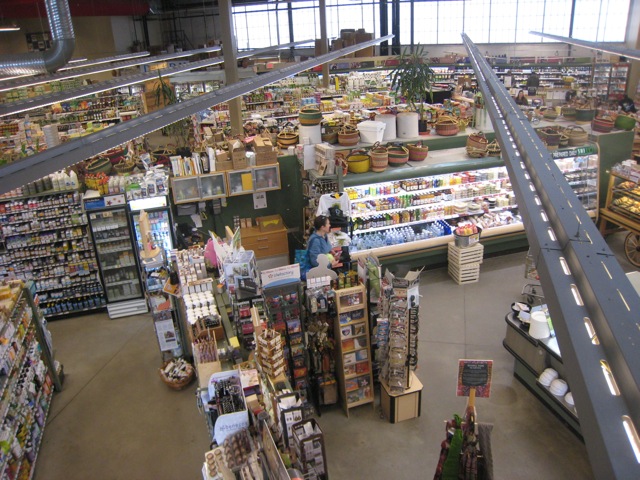For some investors, deciding where to put their money isn’t just about making a buck. Some look for social or environmental returns as well as financial ones. Now, some people also want a local return, and some businesses are are doing a kind of local crowd-sourcing for loans.
MORE: New England Public Radio’s A New Kind Of Local
Business owners have always turned to family and friends when they need to borrow. Now some are turning to you and me.
A lot of people want to lend. Including 68-year-old Peter Schlessinger from the group Invest Here Now, which educates people who want to do just that.
“Build up the environment in which they live, in which they walk, work, play — where they connect directly to the people that they have backed,” he says.
Schlessinger, who has taken all of his money out of the stock market and invested part of it in the Pioneer Valley, says putting money where you live can strengthen that economy even in tough times.
“You’re investing in local businesses that do business locally as well,” he says. “So that if things go down everywhere else it’s the places that have built these networks of inter-relationship that will be more resilient and have an easier time.”
Wall Street or co-op?

One of the places Schlessinger has invested is River Valley Market in Northampton. The food coop has borrowed several times from co-op members, known as member-owners, like 67-year-old Cheri Cross.
“I signed over the check and it was a really wonderful feeling!” she says.
Cross likes the idea of investing in a business that buys from small farms and where she knows people. She says before her investing felt anonymous.
“I have a sense of immediacy, a sense of intimacy, a sense of personal connection that just brings additional dividends,” Cross says. “So they go through my whole body, you know, not just my wallet.”
The wallet could do okay too. Depending on the size of the loan, a lender can earn as much as 5 percent, far better than interest from a bank. But unlike a bank, the co-op isn’t FDIC insured. Cross understands these are unsecured loans.
“I have so much more confidence in the local co-op than I do in Wall Street, frankly,” she says.
Cross and about 200 others recently invested a total of $2.4 million in the Northampton coop. Previously member-owners invested more than $1 million. That’s been paid back.
Another business, Real Pickles in Greenfield. has also borrowed from investors locally.
“This is sauerkraut. It has been in the barrel for four, five months,” explains Heather Wernimont, as she lifts cabbage, with dill, caraway and salt out of barrels.
The company sells $750,000 worth of garlic dill pickles and other fermented vegetables a year. But founder Dan Rosenberg says its mission is about more than selling lots of pickles.
“[We] always buy our vegetables and fresh herbs and spices from within the Northeast and as locally as possible,” he says. “And only sell our products within the Northeast as a way of promoting this idea of a regional food system.”
Trusting your neighbors
This spring, Real Pickles became a worker-owned co-op. It cost a half-million dollars to finance the transition. Instead of borrowing from a bank or established lenders, Real Pickles – after getting the okay from state regulators – invited people from the region to invest.
“Our annual target dividend…will be 4 percent, however there’s no guarantee that investors will receive dividends in any particular amount in any given year,” says Rosenberg, reading from the prospectus that laid out the risks.

So there’s no guarantee that people will make any money at all?
“That’s right!” he says. “There’s a certain amount of trust that was necessary for investors to have in us and our cooperative for them to make this investment.”
People could also lose what they invested. To soften the risk the worker-owners agree not to partake in profit sharing unless they pay investors dividends of at least 4 percent. The half-million dollars was raised quickly, in less than two months.
Risky investments could be risk the movement
Chris Sikes, the CEO of Common Capital Inc., a non-profit lender in Holyoke, says there’s pent up demand right now for opportunities to invest in the local community. He says he wants local investing to succeed, but he’s concerned, in some cases, individuals could take on a high level of risk and lose their money.
“They don’t have the experience to be a lender,” Sikes says. “And they’re, sometimes, putting their money into projects or businesses where they don’t know anything about the business other than they like what the business does. And I’m very concerned that there will be losses and people will be discouraged from investing locally.”
Sikes started the Community First Fund through which individuals can loan to a pool of local businesses, spreading out the risk. The companies include a restaurant, an electronic recycler and a food market. Investors get a 2 percent annual return.
So far, nearly a half million dollars has been invested — money that Sikes says is secure and backed by the funds’ assets.
Another way he tries to reduce risk: his firm uses grants from the Small Business Administration and others to help the companies manage their businesses.
“I think we need to be very careful, everyone of us who is involved in taking local dollars, in making sure that every investment succeeds,” Sikes says.
The local part of local investing may help it succeed. Some business owners say they feel more accountable, when their lenders are also their neighbors.
